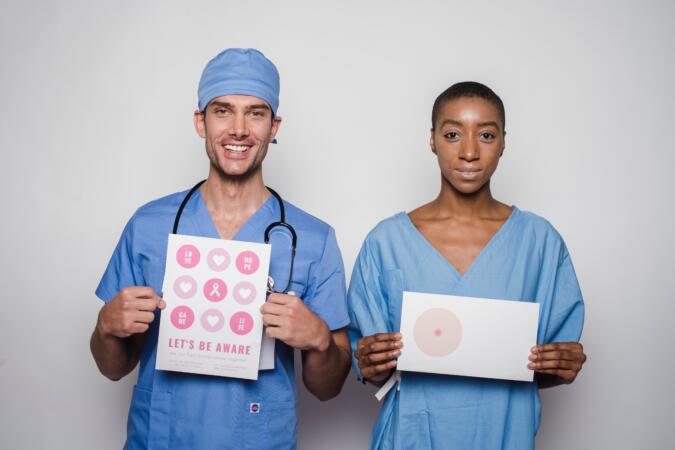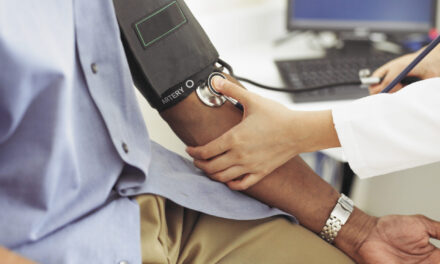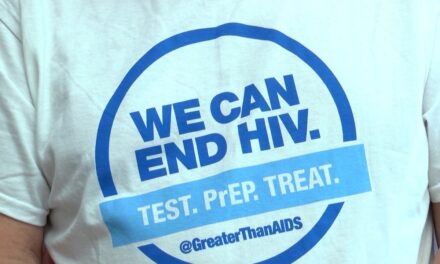
The study, which was published by the JAMA Network Open Journal, determined that Black women should start getting screened for breast cancer at 42, nearly a decade before most practitioners recommended a patient get checked. Coral O. Omene, MD, Ph.D., program director of Breast Cancer Disparities Research and medical oncologist in the Breast Oncology Program at Rutgers Cancer Institute of New Jersey, said this revelation is far behind schedule.
“The findings confirm what we have known for some time that Black women are disproportionately negatively affected by breast cancer,” she explained to Blavity. “They have a higher incidence of aggressive subtypes of breast cancer, such as triple negative breast cancer, which occurs at earlier ages in this population.”
Omene went on to describe just how detrimental breast cancer is in Black communities, affecting both men and women.
“We know that horrible [statistic] of black women having a higher mortality rate up to 41% higher than their non-Black counterparts. That … statistic is horrendous. And that is a crisis,” she added.
Why? Well, Omene said that the disparity is “multifactorial.” Biology is one of them.
“We know that there are mutations of genes related to breast cancer that are pathogenic, meaning that they have extremely high chance of causing breast cancer over the lifetime of that patient. That patient, for instance, may be up to 85 times more likely to have breast cancer, because of the mutation. For breast cancer, besides external risk factors, there is a genetic component to that,” she explained.
Of the many external risk factors, including smoking and alcohol use, Omene says the biggest one compromising Black women is obesity.
“Obesity unfortunately disproportionately affects black women,” Omene said. This is due to a number of reasons, that is all baked into the disparity that exists historically for this population. Many Black communities are food deserts, meaning there’s a lack of access to good foods. That leaves people in these communities to have to rely on fast food or unhealthy foods for sustenance, which makes obesity prevalent.”
Omene explained that obesity “causes chronic inflammation in our tissues that can lead to [gene] mutations over time, and other factors in the microenvironment in our bodies. Those internal changes increase risk for cancers, not just breast cancers, other cancers as well.”
Age is another factor worth noting when it comes to breast cancer.
“So there’s a linear relationship, the older that woman gets, the more of a chance she may develop breast cancer. So that is not to say that young women don’t develop breast cancer, but increasing age increasing risk,” Omene said.
Socioeconomic barriers that make getting screenings and treatment difficult for Black people are also a major factor.
“Lack of good quality care and a cultural awareness of breast cancer and how to get ahead of it plays a big role in why Black women are more impacted by this disease,” Omene said.
When it comes to mammograms, Omene explained that because breast cancer studies have typically neglected to look at how the disease effects communities of color, the belief was women should start getting breast cancers screenings at 50 “biannually.” However, this has been debated for quite some time.
“In my profession, and what we tell patients we’ve always maintained, to start, at least for the average risk woman is at age of 40,” she said. “Obviously, patients who have higher risk susceptibility susceptibilities, or genetic mutations, they should be screening much, much earlier than the average population. But speaking about the average population, and we’ve always sort of maintained to start at the age of 40.”
Omene shared that the medical community has been aware of the nuances of breast cancer’s effect on Black women.
“We also know that in the black population, where there is an unfortunate disparity in breast cancer outcomes, the disease often presents itself younger and more aggressive than in other racial groups,” she explained. “If primary care providers are adhering to the prior guidelines, there’s a whole host of women that are being missed and falling through the cracks.”
But all hope is not lost. Omene is committed to making sure Black women are educated and aware of the risk factors associated with Blackness and breast cancer. Aside from making lifestyle changes to mitigate external factors, Omene recommended being diligent about screenings.
“The next best thing is to try to make sure you’re doing your detection,” she said. “Go to your screenings on time without fail, because that’s the way to ensure that you catch things early.”
If a doctor’s diagnosis or treatment recommendations don’t feel right, Omene urges patients to seek another practitioner.
“If you’re not comfortable with plans being presented to you, you get another opinion. I feel strongly about that,” she said.



